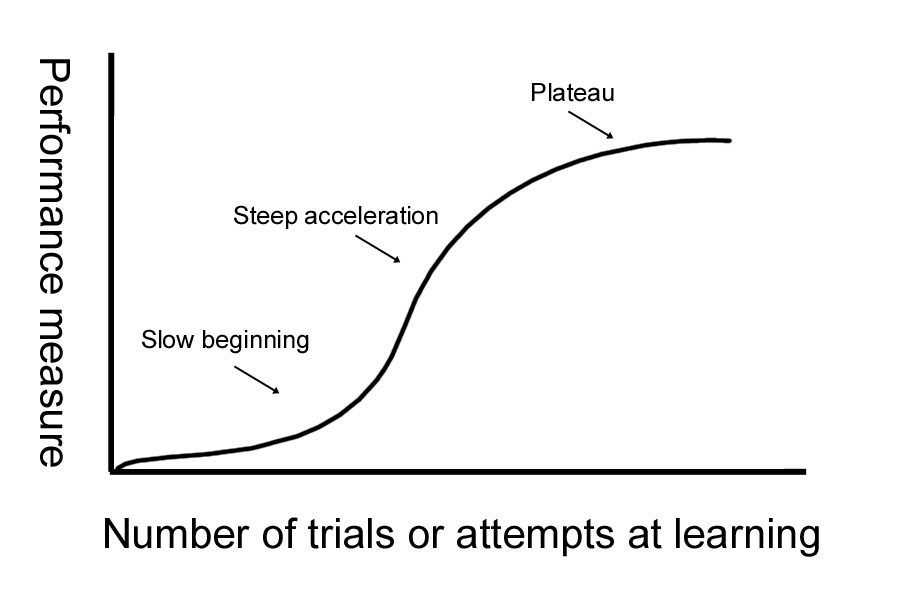Feel like you’re no longer making progress despite studying another language for several months? If your language learning seems to have come to a standstill in spite of your best efforts, don’t worry, this is perfectly normal. You are probably roaming around in what linguists call the intermediate language learning stage. This is a highly frustrating stage experienced by all learners. We have tips for you to overcome this intermediate stage and to reach your goal: the advanced level. Follow the guide!
What exactly is the intermediate language learning stage?
The first few months of language learning are often absolutely wonderful. Progress is swift and easily observed. For the most, we think that at this rate we’ll become bilingual within 6 months! This might be true if learning a language were a linear process… but it is not. Almost all language learners go through what is known as the intermediate language learning stage. Experts named it so, because it is a phase of relative standstill, on the surface at least.

As the name suggests, this stage is normally reached when you progress to the intermediate level of your language learning journey. This may be at B1 level, but for most people the stage is more likely to be reached at B2 level. The road to C1 then seems everlasting… It feels as if you’ve been learning for hours on end, achieving very little or nothing at all.
🧐 B1, B2, C1… These levels don’t ring a bell? Check out the official CEFRL grid to find out what they stand for. We also offer language audits to determine your language level, either freestanding or as part of a training course.
Don’t worry; all your efforts are worthwhile. You undeniably are continuing to improve; your progress is simply more subtle. We know that this learning stage is frustrating, not to mention discouraging. Yet, it’s both perfectly natural and positive: it means you are no longer a beginner!
Here are a few tips to help you get through the intermediate language learning stage and take the advanced level by storm.
Ways to transcend the intermediate language learning stage and reach the advanced level
Be patient
The intermediate stage stretches over time, as you can see in the above figure. In this article, we give you some tips on ways to get through this stage more comfortably and more rapidly. Unfortunately, there is no miracle: to overcome the dreaded intermediate language learning stage, you will have to be patient. Simply be aware that it will take you more time to move from an intermediate to an advanced level than from a beginner to an intermediate level.
Leave your comfort zone
When it comes to languages, stepping out of your comfort zone means tackling your learning from a new angle. If, for example, you were accustomed to listening to podcasts designed for English language learners until now, switch to podcasts designed for native speakers! This may seem like a quantum leap, but it’s by confronting new challenges that you can move up to the next level more quickly.
Opt for personalised training
Once you reach a certain language level, individualised training allows you to progress much faster. Methods designed for beginners are almost all identical. They provide the basic knowledge in terms of grammar and vocabulary. But once you reach the B2 level, you will need customised lessons. Your needs and expectations won’t be the same as those of other learners. Personalised training and the support of a qualified language trainer will enable you to acquire the skills you really need to progress.
📏 Our training courses are customised to meet your specific individual requirements. You will develop the language skills you need for you and your career. Discover our offer!

Know when to take a break
As we have already mentioned, reaching the C1 level requires considerable learning time. However, to avoid risking a language burn-out, you also need to learn to take breaks. Yes, it’s possible to set aside your lessons for a day without this affecting the effectiveness of your learning. Moreover, taking breaks doesn’t mean cutting yourself off from the language altogether. Should you get tired of your vocabulary lists, watch a programme in your target language instead. You can then return to your vocabulary with a clear head later.
💡 Talking of breaks, did you know that sleep has a role to play in your language learning? Find out why in our article: ”Learn a language while you sleep: fact or fiction?”
Vary exercises
This tip isn’t specific to the intermediate stage: it applies throughout your learning process so that you can progress more quickly. Varying exercises allows you to use all four of the language’s cornerstones, which are:
- written comprehension (reading);
- written expression (writing);
- oral comprehension (listening);
- oral expression (speaking).
Only by working on these four key areas is it really possible to reach a higher level in a foreign language.
1to1PROGRESS language training courses are designed to adapt to the level and needs of each individual learner. If you are stuck on the intermediate stage and need help to reach the advanced level, contact us! We will work out a personalised and motivating training programme with you.





